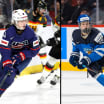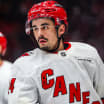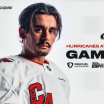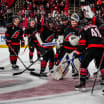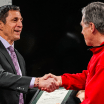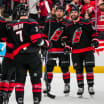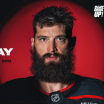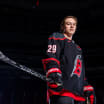RALEIGH, NC. -In Chris Huffine's parents' home, in an old bedroom used for storage, there are dozens, maybe hundreds of VHS cassettes.
They tell the history of the Carolina Hurricanes literally from the first day they arrived in North Carolina from Hartford. The tapes also tell the story of a Greensboro, North Carolina boy who came to love the game in an unusual way but whose mark on the franchise is continuous and in some ways everlasting.
The tapes are mementoes of a craft well-learned, a life well-lived and of relationships that, like the tapes themselves, stand the test of time.
Burnside: The Tale of Huffine's Tapes
"There's no one better. I know that for a fact. There may be guys as good, but nobody's better. Can't be. Because he won't' stop until he gets it right. Any little thing."
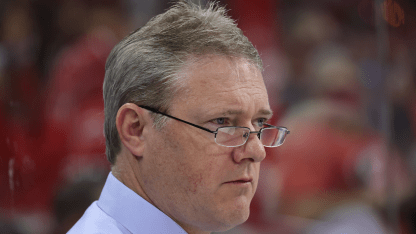
"I can't let them go," Huffine admitted. "I don't know. I just can't. There were so many hours put in there."
He might have been from Buffalo or Red Deer or anywhere where hockey is life and it would be totally understandable. But the twang, still distinctive even though he's spent thousands of days in rinks around North America and beyond, gives Huffine away.
He grew up in Greensboro, about 80 miles from Raleigh.
His father was military and while stationed in the former Czechoslovakia and Germany came to appreciate the game of hockey.
Back in Greensboro, Huffine's brother, 11 years older, played and was quite good.
And so Huffine, now the father of two boys aged 10 and 13, was around the rink a lot even though his own hockey playing amounted to little.
"I think about my kids now, my kids are having tryouts," Huffine said during a chat at PNC Arena. "The opportunities that kids now have here, I had none of that."
Sometimes Huffine's older brother would take him to the Carolina Circle Mall which had an ice rink in the middle of all the shops. You couldn't use hockey sticks or anything but you could work on your edges. But the ice wasn't the greatest.
"There would be an inch of water on it," Huffine recalled. "If you fell a couple of times you were soaking wet from head to toes."
He remembers working on crossovers and falling and watching the water spray all up the boards with shoppers watching on in amusement.
When Huffine was older he would take in Greensboro Generals games in the East Coast Hockey League. One day he was watching a guy, a security guard or maybe he was an usher, who was manning a camera taping the action on the ice.
Huffine pantomimes someone sitting with one hand on a camera handle idly swiveling it back and forth.
"He was just sitting there with a little camera, pan back and forth and I thought to myself, well I could do a better job than that. I went in there and got my foot in the door and went from there," Huffine said.
And so what would be the first step on something that would become more passion, even obsession, than career was taken as he began as the part-time video coach for the ECHL's Greensboro Generals.
Huffine's father was a local high school football coach and with his military background there was a strong emphasis on preparation which Huffine carried into his new job.
When the Generals moved on the Carolina Monarchs came to town, the American Hockey League affiliate of the new Florida Panthers team.
It turned out to be a fortuitous arrangement as head coach Rich Kromm, a former NHLer, and assistant coach Jon Christiano gave Huffine a chance to continue on with his video work while also crystalizing the importance of what was a nascent part of the game at the time.
Christiano was a protégé of the legendary Roger Neilson, considered the father of video coaching in the NHL, and Christiano was able to share much of that considerable insight with a young Huffine.
"He knew how important the video could be, or how it could be used and so actually I was there and I was very hungry and he still to this day is a mentor to me," Huffine said.
Huffine met Nielson once. But it was Christiano who would have a lasting impact on Huffine's life and career. It was alongside Christiano that Huffine first learned that the secrets to the game, the subtle elements of how the game is played and defended and attacked, were all hidden within the video. All you had to do was unlock those secrets.
"His biggest quality at that time is he was passionate and he was a detailed sort of perfectionist," Christiano recalled. And the fact that in the beginning Huffine was sort of a volunteer and then a part-time video person was also attractive to a minor-pro team where budgets were never vast.
"We needed video. We all knew we needed video," said Christiano, who recently ended a long career with the Buffalo Sabres in a variety of scouting and development positions.
Huffine asked lots of questions and was eager to learn.
What did the Monarchs need or want to know about opposing teams that could be gleaned from watching video of their games?
What distinct parts of the games did the coaching staff need to study to then pass along information or knowledge to their players? "He had a lot of questions," Christiano said. "It set off a switch for him."
Huffine built a portable stand on which he could put VCRs and television monitors that could be wheeled from room to room.
"Back then that was a big deal," Christiano said.
The longtime coach recalled reading a quote from a book by sports writer and commentator John Feinstein that went something along these lines; to win the game is great, to play the game is greater, but to love the game is the greatest gift of all.
"I thought that would be like Chris," Christiano said. "He's such a perfectionist. And the time he spends doing it. I can't imagine there are guys doing the same thing. He's come a long way."
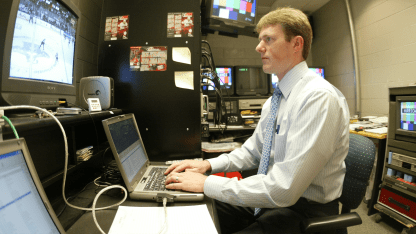
When the Carolina Hurricanes pulled up stakes and moved from Hartford to Raleigh in the summer of 1997 the deal was the team would play in Greensboro for two seasons while the Hurricanes' permanent home was being built in Raleigh.
Paul Maurice, then the youngest coach in the NHL, took advantage of Huffine's presence and expertise and hired him to help with the Hurricanes' video needs during their time in Greensboro.
To listen to Huffine describe the job in those days is to imagine what life was like as a pioneer in the early days of this country.
First, all games had to be recorded on VHS tapes. Then if you were doing a pre-scout on an opposing team you had to watch all two-and-a-half hours, making notes on specific areas you wanted to record on another VHS, like power plays or penalty kills or faceoffs.
Huffine was on a first-name basis with the local electronics store as he would regularly buy VHS tapes in bulk. At times he would have six VCR recorders in his care.
"Literally I would go to Sam's Club and I would take every dime I had and I would buy those huge packs of VHS tapes," Huffine said.
Huffine started up his own small construction company to help pay for his hockey habit and so he could adjust his own work hours so he could be at hockey games.
In those days the job required a network of like-minded folks who were willing to help in sharing information that is now just a click away.
"Back in the day I used to call (Tampa Bay Lightning video coach) Nigel Kirwan up in Tampa when I was coming in and say hey Nigel, two weeks in advance, hey can you record these three games for me? And basically if he didn't record those three games on VHS tapes and bring them to me I was in trouble. And it was vice versa. So you had to work with people, and then basically the only information coaches had was what you took off that VHS tape," Huffine said.
"Now everything's digital. You can import to video, download to video and import the stats, all the NHL stats it's on the sheets, you can import them right on top of the video," Huffine said. "So, now if you want to see all the faceoffs within a matter of minutes you can pull all those things up and know who took the faceoff, whether it was won or lost, where it was at."
It wasn't just Huffine's peers in the burgeoning video coaching community with whom he had to forge a relationship with, it was also some of the people closest to him in his life. Like his brothers, parents and future wife Heather.
During those first two seasons with the team operating out of Raleigh but playing in Greensboro, sometimes Huffine would drive tapes of pre-scouts from Greensboro to the team's offices near the Raleigh airport behind a LaQuinta hotel to Maurice and his staff. And then drive home.
In Greensboro, Huffine had created a system with four satellite dishes attached to an array of VCRs so he could tape all the games he needed to to keep the Hurricanes on top of what opponents were doing in advance of their games. Additionally, he was holding up his end of the bargain for colleagues on other teams looking for pre-scout materials.
But Huffine is fastidious and didn't trust the timing mechanism on the VCRs so he used to record the games manually. If he was home. But if he was at a Hurricanes game or on the road he'd ask his brothers or parents to help out. Or Heather whom he met during the 2001-02 season when the Hurricanes advanced to their first-ever Stanley Cup final.
"I used to think 'oh she's never going to marry me.' Because every night she had to be there to record games and she had to be home to start the game because I didn't trust the timer. I was too nervous. We'd set timers but I was nervous for the timers," Huffine said.
Sometimes video coaches on other teams would call Heather and ask her to help out with a pre-scout of a Canes game.
"She would tape games for the other team because I was on the road," Huffine said.
Every night four or six games might be on the dockets.
"I can remember when DVDs came out and I'm telling your right now when DVDs came out I thought I had won the lottery because I could jump forward five minutes at a time. I could jump through the intermissions," Huffine recalled with a laugh.
And what used to pass for portable is now, well, laughable.
Huffine recalled carrying a box with a mini-recorder when the team played Detroit in the 2002 final. It weighed 50 lbs.
"I thought I was the man," he said with a laugh. "I had this thing I could carry to my room. I could set it up. I had this big rolling case I travelled with. It was like my baby. I took it up on the plane with me. Nobody touched. Literally nobody touched it."
Now? A laptop that weighs like a feather.
"With Chris, if people knew what he did, they'd be awestruck," Christiano said. "He's putting information at the fingertips of the coaches so they can coach. He's not just taping games and putting them on the coaches' computers. A good video guy, he's one step ahead of the action."
Before the trade deadline, for instance, the video coach may be asked to find all of the touches for a particular player in the previous 10 games. Or how does that player perform in the defensive zone over the past 10 games?
Can someone who watched all of those games in person do a better job or have a better idea of what that player is like than the video coach who assembled all that information that allows all of the coaches and management to make an assessment on this potential asset?
No.
"A lot of days you're just dog-tired," Christiano said.
If this was simply about how technology has changed an integral part of the game, well, it would still be interesting. But the layers to this are deeper, more complex.
Let's start with the sheer constancy of Huffine's work over all of these years.
Starting with a young Maurice - and then again when Maurice returned for a second go-round in 2009 - and on through Peter Laviolette and the team's run to the 2006 Cup, through to Rod Brind'Amour, whom Huffine knew as a player, development guy and long-time assistant and now as one of the top coaches in the game. Huffine has had a hand in virtually every game played by this franchise since arriving in North Carolina.
Laviolette took over for Maurice 30 games into the 2003-04 season. The Hurricanes missed the playoffs that spring and Laviolette could have gone to GM Jim Rutherford and told him he was going to switch up his staff.
"But I really liked the staff that we had," Laviolette said in a recent conversation.
The lockout followed and then in 2005-06 it all came together as the Hurricanes won their first and only Stanley Cup. Part of that was Laviolette's comfort with his staff including Huffine.
"I really liked working with Chris. Back then it was a one-man show, it's a tremendous amount of work," Laviolette, currently the head coach in Washington, said. "He's such a hard worker and such a great guy."
The fact that Huffine didn't come from a traditional hockey background but brought such knowledge to the table remains a source of great respect for Laviolette - who included Huffine on his staff as head coach of Team USA at the 2006 Olympics in Turin, Italy.
"He's kind of self-made and self-built with regard to that," Laviolette said. "We really tried to build a team and tried to build a family. And when you go through that run together and become champions together there's always something special with that group."
Every time Laviolette is in town or the Hurricanes come to Laviolette's town the veteran coach seeks out Huffine and gives him a big hug.
The term family is an overwrought one when it comes to a professional sports team.Yet it's a quality that is very real to Huffine and is part of the reason he is still here after all this time.
"I'm blessed in that area. I try to come in and work as hard as I can every day. I try not to take shortcuts. I never have taken shortcuts," he said. "And I've been blessed. Paul Maurice is unbelievable. Great man. A great teacher. And I learned so much from him. And Peter Laviolette's one of the most special people I've ever met. He's done a lot for me and he is one of the best coaches in the NHL. Hands down."
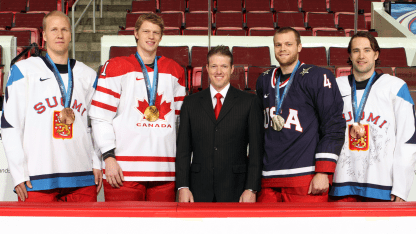
And of course now there is Brind'Amour, a man Huffine has known since Brind'Amour was acquired as a player from Philadelphia in early 2000. "Coaching's an art and that's one thing I've learned from working with Paul Maurice and working with Peter Laviolette and now working with Roddy," Huffine said. "It's an art. And it's a learned art and it's a hard art. It's a hard working art."
The relationship between Huffine and Brind'Amour and the other members of his staff is symbiotic. From each coach along the way - through every coach in Hurricanes' franchise history frankly - Huffine has stored away vital information and he will call on that knowledge on an almost daily basis.
Even now after his fourth season as head coach Brind'Amour will be amazed at the information Huffine provides and the context in which he provides it. 'Oh, that was a breakout pattern Maurice used and here's why it worked or didn't. Or this defensive alignment worked in these situations, but not in these.'
"I'll ask him something that's as random as ever. Did they do a 6-on-5 thing a week ago that might have been a little different than this? And he'll find it and he'll show it to me or he'll already be ahead of it," the 2021-22 Jack Adams Trophy winner as coach of the year said. "I guess the best thing is he knows what I want to see. He knows how I think. So when he presents something to me on the other team it's precise and it's exactly what I need to see and that's why he's made my job so easy. We're just in sync. He knows exactly how I think, what I need to see and he's committed. He doesn't take a day off. There's nobody better. Can't be."
It might be tempting to suggest that the job done by Huffine is thankless. And to be sure there is little of the limelight involved in his role with this particular professional hockey team. For instance in the first round of the 2022 playoffs Huffine did a deep dive on future Hall of Famer Patrice Bergeron's face-off tendencies.
"I go through 357 faceoffs to pull out the 10 that we need or the 15 that we need and I even got the 50 that we need just in case I need to make a point. Like if we have an issue, I try to streamline as much as possible for all the guys," Huffine explained.
It's no wonder, then, that the respect felt and shown for Huffine by Brind'Amour and his staff is palpable.
In a recent conversation with assistant coach Tim Gleason he described Huffine as the brains of the coaching operation. Brind'Amour described the coaches' office where they gather daily including after games to break down video as Huffine's office.
"Sometimes I take the hard way around things. And there's a reason why because of the way I feel like you learn and I try to learn every day. Because I'm telling you this game evolves every day," Huffine said.
"And if you just let the NHL stats do it for you, you're missing the small things. And the reason why teams win and lose, this is the difference between dynasties and teams that win, everybody's trying to do the same thing. So, this is all covered and then you have the next level of detail and everybody's trying to do that. But then there's a third, fourth, fifth and sixth level detail and it's those things that you have to sometimes put pen to paper whatever you want to say to dig out and you have to dig them out. You have to dig them out," Huffine explained.
"I always think when the game's played right it's played in sequences. So it's like you see one thing but what led to that? And what caused that? And what are they thinking there? So I still do things the hard way. I still watch every pre-scout and that's why I stay up all the time and that's why I look kind of grey-haired like I do," he said with a laugh.
But at the end of the day he can take satisfaction in the fact that when he is done presenting to Brind'Amour or the rest of the coaching staff or if he's talking to a group of players he believes totally in what he's saying.
"Because I care so much about the team and Roddy when I tell him something I want to believe in my heart that I'm right. It makes it easier for me to stand up and say 'hey I believe this. Because I've watched it,'" Huffine said.
Brind'Amour is unequivocal in his assessment of Huffine's role in the business.
"There's no one better. I know that for a fact," Brind'Amour said. "There may be guys as good, but nobody's better. Can't be. Because he won't' stop until he gets it right. Any little thing."
We share Brind'Amour's assessment and Huffine pauses and the emotion is obvious, what a comment like that means.
"It's not working for Roddy. I work with Roddy. That's the way our whole staff is. I work with these guys," Huffine said. "I try to take as much pressure off of them as I can. I just try to tie it all up into a nice bundle because their time is valuable. It's like a butcher. I'm trying to take all the fat off the steak so when he gets the steak he's just preparing the steak because that's really what he's paid to do. He's not paid to trim the fat."
Can you win without that kind of relationship?
"I don't know. Maybe you can. Put it this way, when you care about the people you're working with, really care, it makes a difference. It's no different than your family," Huffine said. "I actually spend more time with these guys than I do my family."
Worth A Click:
Canes Re-Sign Bear To One-Year Contract
Canes Re-Sign Mattheos To One Year Deal
Canes Agree To Terms With Lagesson
Kids Gear Up For 2022 First Goal Program
Montgomery Stands Out, Takes It In At Development Camp
Pacioretty Eager To Help Canes In Areas Of Need
CanesCast Episode 218: Trading Frenzy
Burns 'Energized and Excited' To Join Canes
Canes Offseason Player Tracker



